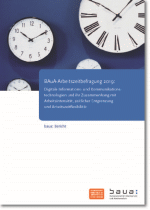BAuA-Working Time Survey 2019: Digital information and communication technologies and their association with work intensity, temporal boundarylessness and working time flexibility
(in German)
Even before the COVID-19 pandemic, work with digital information and communication technologies (ICT) was widespread in Germany. However, there is controversy about whether, and if so to what extent, the use of ICT has an influence on work intensity, the risk of temporal boundarylessness and growing flexibility requirements and can therefore lead to psychological stress among employees. Furthermore, working with ICT is often related to increased job autonomy. More temporal flexibility and job autonomy can be job resources of working with ICT, which often correlate to job satis faction and work-life balance.
This report first describes the spread of occupational use of digital ICT and the introduction of new computer programs for dependent employees. This is done on the basis of the BAuA-Working Time Survey 2019 (n = 8 371), a representative survey of employees in Germany. Subsequently, various work (time)-related demands and resources are examined: In addition to the intensity of the work, temporal boundarylessness and working time flexibility demands (mostly perceived as stressful), working time control is also considered as a possible resource for coping with work demands. Finally, the relationship between ICT use and the health and well-being of employees, or their satisfaction with work and work-life balance, is examined.
The results point out that the introduction of new computer programs in particular is associated with demands on working time, such as greater work intensity or blurring boundaries between work and private life. Employees who work with ICT and new computer programs have more influence on their workload and the planning of their work tasks. In contrast, they do not have more working time autonomy. While employees who work with digital ICT report a better general state of health overall, there are indications of a connection between the introduction of new computer programs and a risk of exhaustion.
Please download the complete report "BAuA-Working Time Survey 2019: Digital information and communication technologies and their association with work intensity, temporal boundarylessness and working time flexibility" (in German only).
Bibliographic information
Title: BAuA-Arbeitszeitbefragung 2019: Digitale Informations- und Kommunikationstechnologien und ihr Zusammenhang mit Arbeitsintensität, zeitlicher Entgrenzung und Arbeitszeitflexibilität.
Dortmund: Bundesanstalt für Arbeitsschutz und Arbeitsmedizin, 2022. pages: 40, Project number: F 2507, F 2490, PDF file, DOI: 10.21934/baua:bericht20221128
